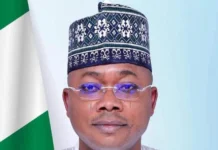By Chimezie Godfrey
The Africa Network for Environment and Economic Justice (ANEEJ) has called for transparency and accountability in Nigeria’s national public debt, Special drawing Right, SDR, and financial management.
ANEEJ in collaboration with Africa Forum and Initiative for Debt and Development (AFRODAD) organized African Conference on Debt and Development (AfCODD 2022) Nigeria National Conference on Debt and Development at the K-Class Hotel, Wuse Zone 5, Abuja on 18 August 2022.
The conference is a build up to the AFCoDD 2022 and brought together Government Leaders, Civil Society Organisations, private sector, Media, and Multilateral Financial institutions to discuss and agree on commitments to end the debt crisis and build a new debt movement.
The AfCoDD 2022 with the theme “From Recovery to Reform: Sisi Ndio Tuko – Stop the Bleeding” seeks to promote discussions and debate on how Africa moves from planning for recovering from multiple crises to planning for engagement of the continent in a reformed global economic and political architecture with Africa as a rule maker and not a rule taker.
The national conference will feed into the pan-Africa conference on Debt and Development scheduled to hold from 24-26, 2022 in Lilongwe, Malawi.Pursuant to the above, the Nigerian national conference was organized with the primary objective of strengthening transparency, accountability and governance on Debt management.
The following issues were robustly discussed in the four panel sessions: Reforming the global financial architecture with focus on Nigeria with Covid-19 as a factor, taking stock of the Special Drawing Rights Effect on Debt and Development, the debt crisis amid a hemorrhaging Nigerian economy, and galvanizing African voices towards COP 27.After successful deliberations, it was resolved as follows:Nigeria’s economy is bleeding profusely amid a debt crisis due to opaque nature of debt contracting systems and lack of political will to deal with issues of corruption and Illicit Financial Flows (IFF).
The conference noted that there is therefore need for the Executive arm to exercise political will and end the culture of impunity.The utilization of SDRs is shrouded in secrecy with no information in public domain by the Federal Government. There is no parliamentary coverage of the SDRs issue in Nigeria.
It stated,”To this end, the National Assembly should hold a public hearing on the issue and invite the Minister of Finance, Budget and National Planning and the Governor of Central Bank to explain the use of $3.4bn SDR allocated by IMF since 23 August 2021 sitting idle in the CBN as well as to explain the use of the $3.4bn Covid-19 facility granted by the IMF which has been fully drawn down.
“There is need for a pan-African approach to the SDRs contribution, allocation and management that takes into recognition the capacity to deliver greater public good to Africans.Nigeria’s borrowing appetite was also considered as one of the major reasons why Nigeria is in debt crisis.
The conference agreed that rather than further borrowings, Nigeria should leverage on its rich resources through an enhanced DRM that knocks out IFFs, profit shifting, tax evasion and avoidance, unbridled looting with impunity and unnecessary tax holidays.
“The current Debt servicing Strategy 2020-2023 is not inclusive as it does not reflect modern day reality. It lacks a broader citizen and CSO inclusive approach just as most of the baseline underpinning the strategy such as real GDP, Oil production volume and continued reliance on Debt/GDP ratio no longer hold.
“Therefore, there is the need for immediate review of Nigeria’s debt strategy and policies to make them inclusive with CSO involvement in loan contraction and monitoring processes.
“Since the enactment of the Fiscal Responsibility Act in 2007, the consolidated debt limits of the federal, states and local governments have not been set by any President! This has worsened debt management crisis and reinforces calls for reforms in the nation’s debt management architecture,” it stated.
The meeting called on President Muhammadu Buhari to set the limits in obedience to the FRA 2007.
It noted that the 5th National Development plan 2021-2025 needs N350trillion to implement just as the government is developing a blue print to achieve vision 2050 agenda and that reliance on traditional sources of borrowing or resource mobilization wouldn’t be enough to meet the plans.
“Therefore, the government must stop tax waivers and block all financial leakages. The conference recommended a stoppage of subsidies on consumption and rather provide subsidies for production.
“It also recommended securitization and use of derivatives as well as CSOs/citizens active participation in politics.Nigeria is failing to access Climate finance as debt is crippling the government’s plan of meeting the Paris Agreement on Climate Change.
“There is a need for a national position to be articulated and put together led by the Federal Ministry of Environment with Civil Society participation ahead of COP 27. There is a need for an African sign-on Statement to be taken to COP 27,” it stressed.
The conference noted the need for sustained interrogation of the international financial system as the multilateral financial institutions were established and managed in ways and manners that stifle the growth and development of the south, including Nigeria.
It stressed the need for a nation-building elite that will free Nigeria’s national resources and politics from external control.
According to the meeting, there is also need to join forces with like-minded nations/regions advocating the reconstruction and reform of the Bretton Woods Institutions.




